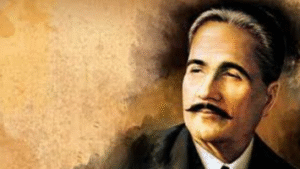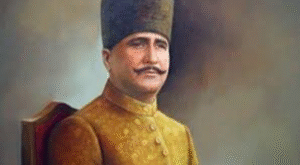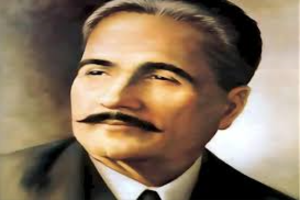Have you ever wondered about the man whose poetry ignited the dream of Pakistan and whose philosophical thoughts continue to inspire millions across the globe? Muhammad Iqbal, often revered as Allama Iqbal, stands as one of the most influential figures in South Asian history.
Muhammad Iqbal’s journey from a humble beginning in Sialkot to becoming the spiritual father of Pakistan is nothing short of extraordinary. His profound poetry, philosophical insights, and political vision transformed him into a beacon of hope for Muslims in the Indian subcontinent during the early 20th century.
Through his literary masterpieces and intellectual contributions, Iqbal addressed themes of spirituality, nationalism, and human dignity that continue to resonate today.

Quick Facts About Muhammad Iqbal
Full Name: Sir Muhammad Iqbal
Nickname: Allama Iqbal, Hakeem-ul-Ummat, Mufakkir-e-Pakistan
Date of Birth: November 9, 1877
Age at Death: 60 years (died April 21, 1938)
Birthplace: Sialkot, Punjab, British India
Nationality: British Indian (later Pakistani influence)
Profession: Poet, Philosopher, Barrister, Politician, Academic
Zodiac Sign: Scorpio
Height: Approximately 5’8″ (173 cm)
Weight: Average build for his era
Eye Color: Dark brown
Hair Color: Black (graying in later years)
Net Worth: Modest by today’s standards; wealthy intellectual of his time
Marital Status: Married (multiple times)
Spouse/Partner: Karim Bibi (first wife), Sardar Begum (second wife), Mukhtar Begum (third wife)
Children: Miraj Begum, Aftab Iqbal, Javed Iqbal, Munira Bano
Social Media: Not applicable (pre-digital era)
Early Life and Family Background of Muhammad Iqbal
Muhammad Iqbal was born into a devout Muslim family in Sialkot, a city that would later become part of Pakistan. His father, Sheikh Noor Muhammad, was a tailor by profession but possessed deep spiritual inclinations and supported his son’s educational pursuits wholeheartedly. Iqbal’s mother, Imam Bibi, was known for her piety and played a crucial role in instilling Islamic values in young Muhammad.
The Iqbal family, though not wealthy, prioritized education and spiritual development. Sheikh Noor Muhammad, despite his modest means as a tailor, ensured that his children received quality education. Muhammad Iqbal had several siblings, but he emerged as the most academically gifted among them. His family’s emphasis on both worldly knowledge and spiritual wisdom would later become hallmarks of Iqbal’s own philosophy.
Growing up in Sialkot, Iqbal was exposed to the rich cultural heritage of Punjab while also witnessing the challenges faced by Muslims under British colonial rule. This early exposure to both Islamic traditions and Western influence would significantly shape his worldview and intellectual development.
Education Journey of Muhammad Iqbal
Muhammad Iqbal’s educational journey was remarkable for its breadth and depth. He began his primary education at a local school in Sialkot, where his exceptional abilities quickly became apparent to his teachers. His early education was rooted in traditional Islamic learning, including Arabic and Persian languages, which would later prove instrumental in his literary career.
For his higher secondary education, Iqbal attended Scotch Mission College in Sialkot, where he excelled in Arabic, Persian, and philosophy. His teachers recognized his exceptional talent and encouraged his pursuit of higher learning. It was during this period that Iqbal began writing poetry, showing early signs of the literary genius he would later become.
Following his graduation from college, Muhammad Iqbal moved to Lahore to attend Government College, where he earned his Bachelor of Arts degree in 1897 and later his Master of Arts in Philosophy in 1899. His thesis on ‘The Development of Metaphysics in Persia’ demonstrated his deep understanding of Islamic philosophy and Persian intellectual traditions.
The young scholar’s thirst for knowledge led him to pursue legal studies, and he obtained his Bachelor of Laws degree from Government College Lahore. However, his intellectual curiosity extended far beyond the boundaries of South Asia, prompting him to seek higher education in Europe.
European Education and Intellectual Development
In 1905, Muhammad Iqbal traveled to Europe for advanced studies, first attending Trinity College, Cambridge, where he earned another Bachelor of Arts degree. His time at Cambridge exposed him to Western philosophical traditions and allowed him to engage with leading European intellectuals of his era.
Following his studies at Cambridge, Iqbal moved to Germany to pursue his doctoral studies at Ludwig Maximilian University of Munich. He completed his PhD in Philosophy in 1908 with a dissertation titled ‘The Development of Metaphysics in Persia,’ which was later published and remains an important scholarly work on Islamic philosophy.
During his European sojourn, Iqbal also qualified as a barrister from Lincoln’s Inn in London, adding legal expertise to his already impressive academic credentials. This combination of Eastern wisdom and Western education would prove crucial in shaping his unique intellectual perspective.
Early Interests and Inspirations
From his youth, Muhammad Iqbal showed a deep fascination with poetry, philosophy, and Islamic spiritualism. His early inspirations came from classical Persian poets like Hafez, Rumi, and Saadi, whose mystical and philosophical poetry profoundly influenced his own literary development.
The works of German philosopher Friedrich Nietzsche also significantly impacted Iqbal’s thinking, particularly Nietzsche’s concept of the ‘superman’ which Iqbal adapted into his own philosophy of the ‘perfect man’ (Insaan-e-Kamil) in Islamic context. However, unlike Nietzsche’s atheistic worldview, Iqbal’s interpretation remained deeply rooted in Islamic spirituality.
Islamic history and the glory of Muslim civilization also served as major sources of inspiration for young Iqbal. He was particularly moved by the decline of Muslim power and sought ways to rejuvenate Islamic thought and practice in the modern world.
Career Journey of Muhammad Iqbal
Muhammad Iqbal’s professional career began in academia when he returned to Lahore after completing his education. He started as a lecturer in Arabic at Oriental College and later at Government College Lahore, where he had once been a student. His lectures on Islamic philosophy and Persian literature drew large audiences and established his reputation as a brilliant educator.
Simultaneously, Iqbal practiced law, which provided him with financial stability and practical insights into the legal and political challenges facing Indian Muslims. His legal practice was successful, but his true passion remained in the realm of literature, philosophy, and social reform.
During this early period, Iqbal began writing poetry that would later be recognized as revolutionary in both content and style. His early works focused on patriotic themes, advocating for Indian nationalism and unity among different religious communities.
Rise to Literary Stardom
The publication of ‘Bang-e-Dra’ (The Call of the Caravan Bell) marked Muhammad Iqbal’s rise to literary prominence. This collection of Urdu poetry showcased his mastery of the language and his ability to address contemporary issues through beautiful verse. The poems in this collection dealt with themes of self-discovery, spiritual awakening, and social reform.
Iqbal’s reputation as a poet reached new heights with his Persian works, particularly ‘Asrar-e-Khudi’ (Secrets of the Self), published in 1915. This philosophical poem introduced his concept of ‘Khudi’ or selfhood, which became central to his philosophy. The work was later translated into English and brought him international recognition.
His subsequent Persian masterpiece, ‘Rumuz-e-Bekhudi’ (Hints of Selflessness), complemented his earlier work by exploring the balance between individual development and community service. These works established Iqbal as not just a poet but a philosopher of international standing.
Breakthrough Moment and Recognition
Muhammad Iqbal’s breakthrough moment came with his famous poem ‘Lab Pe Aati Hai Dua,’ which became widely popular and demonstrated his ability to connect with ordinary people through simple yet profound verse. However, his most significant breakthrough was the 1930 presidential address to the All-India Muslim League in Allahabad.
In this historic address, Iqbal articulated his vision for a separate Muslim state in the Indian subcontinent, laying the intellectual foundation for what would later become Pakistan. This speech transformed him from a poet-philosopher into a political visionary and earned him the title ‘Spiritual Father of Pakistan.’
The address was a watershed moment not only in Iqbal’s career but in South Asian history. His clear articulation of the two-nation theory provided the ideological basis for the Pakistan movement that would culminate in the creation of Pakistan in 1947, nine years after his death.
Notable Literary Works and Philosophical Contributions
Muhammad Iqbal’s literary corpus includes numerous masterpieces that continue to influence readers worldwide. His major Urdu works include ‘Bang-e-Dra,’ ‘Bal-e-Jibril’ (Gabriel’s Wing), and ‘Zarb-e-Kaleem’ (The Rod of Moses). Each collection addressed different aspects of human experience, from personal spiritual journey to social and political commentary.
His Persian works, including ‘Asrar-e-Khudi,’ ‘Rumuz-e-Bekhudi,’ ‘Payam-e-Mashriq’ (Message from the East), and ‘Zabur-e-Ajam’ (Persian Psalms), established him as one of the greatest Persian poets of the modern era. These works were deeply philosophical, addressing themes of spiritual development, Islamic renaissance, and human potential.
‘The Reconstruction of Religious Thought in Islam,’ based on his lectures delivered at various Indian universities, represents Iqbal’s major contribution to Islamic philosophy. In this work, he attempted to reconcile Islamic teachings with modern scientific and philosophical thought, advocating for a dynamic interpretation of Islam that could address contemporary challenges.
His poem ‘Shikwa’ (The Complaint) and its sequel ‘Jawab-e-Shikwa’ (The Answer to the Complaint) are considered among the finest examples of Urdu poetry. These works present a dialogue between Muslims and God, addressing the decline of Muslim civilization while offering hope for renewal through spiritual awakening.
Awards and Recognition
During his lifetime, Muhammad Iqbal received numerous honors and recognitions for his contributions to literature, philosophy, and public service. The British government knighted him in 1922, and he became Sir Muhammad Iqbal, though he remained critical of colonial policies throughout his life.
Various universities awarded him honorary doctorates in recognition of his scholarly achievements. His election as president of the All-India Muslim League in 1930 was both an honor and a platform that allowed him to present his vision for Muslim political future in the subcontinent.
After his death, numerous institutions, roads, airports, and universities have been named in his honor. Pakistan celebrates Iqbal Day as a national holiday, and his birthday is marked with great reverence throughout the country.

Later Works and Political Involvement
In his later years, Muhammad Iqbal became increasingly involved in politics while continuing his literary and philosophical work. His correspondence with Muhammad Ali Jinnah, the founder of Pakistan, reveals his deep concern for the political future of Indian Muslims and his role in shaping the Pakistan movement.
His final major work, ‘Armughan-e-Hijaz’ (Gift from Hijaz), published posthumously, contained both Urdu and Persian poetry reflecting his mature thoughts on Islamic spirituality and the challenges facing the Muslim world. These poems show a deepening of his spiritual insights and continued concern for Muslim unity and renaissance.
Personal Life of Muhammad Iqbal
Relationships and Marriage Details
Muhammad Iqbal’s personal life was marked by multiple marriages, which was not uncommon in his social context during that era. His first marriage was to Karim Bibi in 1895, when he was just 18 years old. This marriage was arranged by his family and produced two children, but the relationship faced challenges due to Iqbal’s increasing involvement in academic and literary pursuits.
His second marriage was to Sardar Begum, and later he married Mukhtar Begum. Each marriage brought its own dynamics and challenges, as Iqbal struggled to balance his domestic responsibilities with his intellectual and literary commitments. His marriages reflect the social norms and personal complexities of his era.
Despite the challenges in his personal relationships, Iqbal maintained close ties with his children and was deeply concerned about their education and upbringing. His letters to family members reveal a caring father and husband who, despite his busy intellectual life, remained connected to his family responsibilities.
Children and Family Legacy
Muhammad Iqbal was blessed with several children who carried forward different aspects of his legacy. His daughter Miraj Begum was known for her literary interests, while his son Aftab Iqbal became a respected judge. His son Javed Iqbal emerged as a prominent justice and scholar, serving as a Chief Justice of the Lahore High Court and later as a Justice of the Supreme Court of Pakistan.
Javed Iqbal also authored several books about his father, providing valuable insights into Iqbal’s personal life and intellectual development. Through his children, particularly Javed Iqbal, Muhammad Iqbal’s intellectual and moral legacy continued to influence Pakistani society long after his death.
The Iqbal family has maintained the poet’s ancestral home in Sialkot, which has been converted into a museum honoring his memory. This preservation of his personal space allows visitors to connect with the human side of this great intellectual figure.
Hobbies and Interests Outside Work
Beyond his primary occupations as a poet, philosopher, and lawyer, Muhammad Iqbal had several personal interests that enriched his character and informed his work. He was an avid reader with a personal library containing works in multiple languages, including Arabic, Persian, Urdu, English, and German.
Iqbal enjoyed long walks and contemplative moments in nature, which often inspired his poetry. Many of his poems reflect deep observation of natural phenomena and their spiritual significance. He believed that communion with nature was essential for spiritual and intellectual development.
He also had a keen interest in contemporary political developments, not just in the Indian subcontinent but globally. His awareness of world affairs informed his poetry and philosophical writings, making them relevant to broader human concerns rather than merely local issues.
The practice of Islamic prayers and meditation remained central to his daily routine throughout his life. This spiritual discipline is reflected in the mystical dimensions of his poetry and his philosophical emphasis on spiritual development as the foundation for individual and social progress.
Net Worth and Lifestyle of Muhammad Iqbal
During his lifetime, Muhammad Iqbal maintained a comfortable but not extravagant lifestyle. His income came primarily from his legal practice, academic positions, and royalties from his published works. By the standards of his time, he was financially well-off, though he never pursued wealth as a primary goal.
His legal practice in Lahore was successful and provided the primary source of his income. As a barrister with European qualifications, Iqbal commanded respect and good fees in the legal profession. However, he often took on cases based on principle rather than purely financial considerations.
The royalties from his books, particularly those published internationally, contributed to his income. However, in an era before modern copyright protections and mass publishing, literary earnings were modest compared to contemporary standards.
Income Sources and Professional Activities
Muhammad Iqbal’s income was diversified across several professional activities. His law practice remained the most lucrative, but his academic positions at various colleges provided steady income and intellectual satisfaction. He also earned fees from lectures delivered at universities and literary gatherings.
His published works, including both poetry collections and philosophical treatises, generated royalties though these were not substantial by modern standards. The international recognition of his work led to invitations for lectures and conferences, which provided additional income.
Occasionally, Iqbal received grants and stipends for his scholarly research, particularly during his European studies. These financial supports enabled him to pursue his intellectual interests without compromising his family’s financial security.
Lifestyle and Material Possessions
Muhammad Iqbal lived a modest lifestyle that reflected his philosophical values and practical circumstances. His homes in Sialkot and Lahore were comfortable but not ostentatious, furnished in a way that accommodated his large personal library and provided space for study and contemplation.
He owned few material possessions beyond books, which were his greatest treasure. His personal library was extensive, containing works in multiple languages and covering various subjects from classical Islamic texts to contemporary European philosophy.
Iqbal’s clothing style was simple and dignified, appropriate for his professional roles as a lawyer and academic. He avoided unnecessary luxuries and focused his resources on education, both his own continued learning and his children’s development.
His travel, particularly his trips to Europe for education and later for conferences, represented significant expenses but were viewed as investments in intellectual development rather than leisure activities.
Social Media Presence and Public Engagement
Pre-Digital Era Communication
Since Muhammad Iqbal lived in the pre-digital era, his ‘social media presence’ consisted of traditional means of communication and public engagement. His primary platforms for reaching audiences were newspapers, literary magazines, and public speaking engagements.
Iqbal regularly contributed articles and poems to various Urdu and English newspapers and magazines. Publications like ‘Makhzan,’ which he helped establish, served as important platforms for disseminating his ideas and connecting with intellectual circles.
His correspondence with contemporaries, including letters to Muhammad Ali Jinnah, other political leaders, and fellow intellectuals, served a function similar to modern social networking. These letters, many of which have been preserved and published, reveal his thoughts on contemporary issues and his efforts to influence public opinion.
Public Lectures and Literary Gatherings
Muhammad Iqbal’s equivalent of modern social media engagement was his participation in public lectures, literary gatherings (mushairas), and academic conferences. These events allowed him to interact directly with audiences and receive immediate feedback on his ideas.
His presidential address to the All-India Muslim League in 1930 was perhaps his most significant ‘viral moment,’ as the speech was widely reported in newspapers and discussed in intellectual circles across the subcontinent. The ideas presented in this address spread rapidly through traditional media and word-of-mouth communication.
Literary gatherings where Iqbal recited his poetry served as important social platforms where he could gauge public response to his work and engage with other poets and intellectuals. These events were the cultural equivalent of modern social media interactions.
Legacy in Modern Digital Platforms
While Muhammad Iqbal himself never used social media, his legacy has found new life in the digital age. Numerous Facebook pages, Twitter accounts, and YouTube channels are dedicated to sharing his poetry and philosophy with contemporary audiences.
His poems and philosophical quotes are frequently shared on social media platforms, particularly during national holidays in Pakistan and on his birthday. Educational institutions and cultural organizations use social media to promote his work and organize events commemorating his contributions.
Modern scholars and admirers of Iqbal use digital platforms to discuss his relevance to contemporary issues, ensuring that his ideas continue to reach new generations despite the absence of his physical presence.
Controversies and Public Image of Muhammad Iqbal
Intellectual Debates and Criticisms
Throughout his career, Muhammad Iqbal faced various intellectual debates and criticisms, though few could be termed major controversies in the modern sense. His philosophical positions, particularly his reinterpretation of Islamic teachings in light of modern knowledge, drew criticism from traditionalist Islamic scholars who preferred conventional interpretations.
His concept of ‘Khudi’ (selfhood) was sometimes misunderstood and criticized as promoting individualism at the expense of community values. However, Iqbal’s subsequent work ‘Rumuz-e-Bekhudi’ clarified his position by emphasizing the balance between individual development and social responsibility.
Some critics questioned his political evolution from Indian nationalism in his early career to advocating for Muslim separatism in his later years. However, supporters argue that this evolution reflected his deeper understanding of the political realities facing Indian Muslims rather than inconsistency in his principles.
Response to Political Positions
Muhammad Iqbal’s 1930 presidential address proposing a separate Muslim state generated significant debate and some controversy. Hindu nationalist leaders and some Muslim intellectuals criticized this position as divisive and harmful to Indian unity.
However, Iqbal defended his position through subsequent speeches and writings, arguing that his proposal was based on practical political considerations rather than religious prejudice. He maintained that separate political arrangements would actually reduce communal tensions and allow different communities to develop according to their distinct cultural values.
His correspondence with contemporary leaders shows his efforts to explain and defend his political vision while remaining open to constructive criticism and alternative suggestions for resolving communal issues.
Media Coverage and Public Reception
The media coverage of Muhammad Iqbal during his lifetime was generally respectful, though not without critical analysis of his ideas. English-language newspapers in India often provided detailed coverage of his speeches and published works, though they sometimes questioned his political positions.
Urdu newspapers and literary magazines were generally more sympathetic to his work, recognizing his contributions to Urdu literature and Islamic thought. His poetry was widely appreciated across different sections of society, even by those who disagreed with his political views.
International media, particularly in the Muslim world and European academic circles, gave favorable coverage to his philosophical works. His lectures in Europe and the Middle East were well-received and helped establish his reputation as a significant Islamic thinker of the modern era.
Fun Facts About Muhammad Iqbal
Literary Genius in Multiple Languages
Muhammad Iqbal was truly multilingual, composing poetry in Urdu, Persian, and occasionally in Punjabi. His Persian poetry was so accomplished that Iranian scholars considered him among the greatest Persian poets of his era.
The Dreamer of Pakistan
Although Iqbal died nine years before Pakistan’s creation in 1947, his 1930 vision of a separate Muslim state became the ideological foundation for the Pakistan movement. He is honored as the spiritual father of Pakistan.
European Education Excellence
During his European studies, Iqbal earned degrees from Cambridge University, qualified as a barrister from Lincoln’s Inn London, and completed his PhD from Munich University in Germany, making him one of the most highly educated individuals of his generation.
Poetry That Moved Nations
His poem ‘Lab Pe Aati Hai Dua’ became so popular that it is still recited by children across Pakistan and India. The poem’s simple yet profound message about prayer and faith transcends religious boundaries.
Philosopher of the East Meets West
Iqbal successfully synthesized Eastern spiritual wisdom with Western philosophical thought, creating a unique intellectual framework that addressed both traditional Islamic concerns and modern challenges.
The Reluctant Politician
Despite his significant political influence, Iqbal was primarily a poet and philosopher who became involved in politics out of necessity rather than ambition. His political activities were driven by his concern for the welfare of Indian Muslims.
Master of Metaphor and Symbolism
Iqbal’s poetry is renowned for its rich use of metaphors and symbols. His famous symbol of the eagle (shaheen) represents the ideal human being who soars to great spiritual and intellectual heights.
Bridge Builder Between Cultures
Through his education in Europe and deep grounding in Islamic tradition, Iqbal served as a bridge between Eastern and Western civilizations, promoting dialogue and understanding between different cultural traditions.
Frequently Asked Questions About Muhammad Iqbal
What is Muhammad Iqbal most famous for?
Muhammad Iqbal is most famous for being the poet-philosopher who conceived the idea of Pakistan and provided the ideological foundation for its creation. His 1930 presidential address to the All-India Muslim League, where he proposed a separate Muslim state, earned him the title ‘Spiritual Father of Pakistan.’ Additionally, he is celebrated for his remarkable poetry in Urdu and Persian, particularly works like ‘Asrar-e-Khudi’ and ‘Bang-e-Dra,’ which continue to inspire readers worldwide.
Did Muhammad Iqbal support the creation of Pakistan?
Yes, Muhammad Iqbal was the original visionary behind the Pakistan concept. In his famous 1930 Allahabad address, he proposed that Muslim-majority areas in the Indian subcontinent should form a separate federation. Although he died in 1938, nine years before Pakistan’s actual creation, his intellectual and ideological contributions provided the foundation for the Pakistan movement led by Muhammad Ali Jinnah.
What were Muhammad Iqbal’s major literary works?
Muhammad Iqbal’s major works include ‘Bang-e-Dra’ (Call of the Caravan Bell), ‘Asrar-e-Khudi’ (Secrets of the Self), ‘Rumuz-e-Bekhudi’ (Hints of Selflessness), ‘Payam-e-Mashriq’ (Message from the East), and Zabur-e-Ajam’ (Persian Psalms). His philosophical masterpiece ‘The Reconstruction of Religious Thought in Islam’ remains influential in Islamic intellectual circles. His poems ‘Shikwa’ and ‘Jawab-e-Shikwa’ are considered gems of Urdu literature.
How did Muhammad Iqbal influence Islamic philosophy?
Muhammad Iqbal significantly influenced Islamic philosophy by attempting to reconcile traditional Islamic teachings with modern scientific and philosophical thought. His concept of ‘Khudi’ (selfhood) emphasized individual spiritual development within Islamic framework. In ‘The Reconstruction of Religious Thought in Islam,’ he advocated for a dynamic interpretation of Islamic principles that could address contemporary challenges while remaining true to fundamental Islamic values.
What languages did Muhammad Iqbal write in?
Muhammad Iqbal primarily wrote in Urdu and Persian, with Persian being the language of many of his major philosophical works. He was fluent in Arabic, English, and German as well, which enabled him to study various philosophical and religious traditions. His Persian poetry earned him recognition as one of the greatest Persian poets of the modern era, while his Urdu works made him beloved among common people in the Indian subcontinent.
Conclusion…
Muhammad Iqbal remains one of the most influential figures in South Asian history, whose impact extends far beyond the boundaries of literature and philosophy into the realm of nation-building and spiritual awakening. His journey from a small town in Sialkot to becoming the spiritual father of Pakistan exemplifies the power of education, vision, and unwavering commitment to one’s ideals.
Muhammad Iqbal’s vision of human potential, expressed through his concept of the ‘perfect man’ (Insaan-e-Kamil), continues to inspire individuals to strive for excellence in both spiritual and worldly affairs. His emphasis on balancing individual development with social responsibility provides valuable guidance for contemporary challenges.
The story of Muhammad Iqbal serves as a beacon of hope for all those who seek to make meaningful contributions to human civilization while remaining true to their cultural and spiritual roots. His life demonstrates that it is possible to embrace modernity without abandoning traditional values, and to work for one’s community while maintaining a universal perspective on human dignity and potential.



